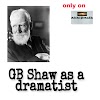George Bernard Shaw as a Dramatist :
George Bernard Shaw is a very renowned figure in the field of literature as his contributions in dramas. Generally, he is regarded as the second-best dramatist in English literature after William Shakespeare. So, he is a major person in the perspective of literary studies. Well, we can’t describe his life or his writings in a single article. But, here I have tried to give as much as major information about him in brief. So, before going to his literary career, we will take a look at his early life.
His Early Life: George Bernard Shaw was born in Dublin, Ireland. And he belonged to a lower-middle-class family. His early education in school life was not so much satisfactory. And that’s why he mentioned, “ I never learned anything in a school.” For that reason, he got engaged in a clerkship job at the age of sixteen. But, then he came to London along with his mother in 1876. As his mother was a singer, he took a try to be a music critic (1888). But, generally, he became a drama critic for the Saturday Review (1895-1898) and he used to spend his maximum time in the ‘British Museum’. Before coming to this dramatic review, he had also joined Fabian Society in 1884 and associated with politics by writing pamphlets for them. However, after being a dramatic critic Shaw started his ultimate career.
Literary Career: One thing to know about him that his career was not started as a dramatist, rather he started by writing novels at that time. But, as a novelist, he was a complete failure. He wrote four unsuccessful novels. These are - ‘Immaturity’, ‘The Irrational knot’, ‘Love among the Artists’, and ‘Cashel Byron’s Profession’.
After that, real G.B. Shaw appeared, as a dramatist. He had written more than sixty plays in his lifetime. And he was very much influenced by Henrik Ibsen. And, this reflection can be seen in some of his plays. At first, if we discuss his personality then, we find he was a very realistic person with very much Intellectual growth. His emphasis on Intellectuality can be seen in many of his plays. For example, in his play, “Man and Superman” he was found to addressing “Life Force”, Intellectual growth of men, superior breeding, etc. Shaw regarded himself as primarily an antiromantic which can be seen in his play, ‘Arms and the Man’, where he stated the futility of war and death in the battlefield has no glory at all (especially in today’s times). Besides this, he was an Iconoclast. And being an Iconoclast, he very often rejects the false social beliefs, superstition, etc. However, he used to replace these with his new point of view in his writings.
His initial plays were of two categories. Pleasant Plays and Unpleasant Plays. His Pleasant plays were alright, but not the Unpleasant ones. As these types of play were generally dealt with direct preaching or straight addressing to the issues like landlords, social prejudices, the romanticized soldier, the critics, religion, prostitution, etc. So, those were banned by the censor. There was an immense satire on those types of plays. Then Shaw understood it and introduced his new element in his plays, called Wit & Humour. And it was the main key tool for Shaw to prevent from being banned from his plays by the censor.
Then, Shaw never stopped and tried to give plays until his death. Later on, he was awarded the Nobel Prize in Literature in 1925. His all-time famous works are - ‘Man and Superman’, ‘Arms and the Man’, ‘Pygmalion’, ‘Back to Methuselah’, ‘Major Barbara’, etc.








9 Comments
Great Sir, this is tremendous
ReplyDeleteThanks....
DeleteSir, please make a detail analyse about History of English Literature.
ReplyDeleteSure.. coming soon. Stay updated
DeleteWonderful and lucid explanation .. Great!
ReplyDeleteThanks.. stay connected with us for our latest articles
DeleteKeep it up ��
ReplyDeleteShould I write this as answer in 14 Mark question
ReplyDeleteYes, you can ... Basically I have written this in note format... However you may add some information while writing..
Delete